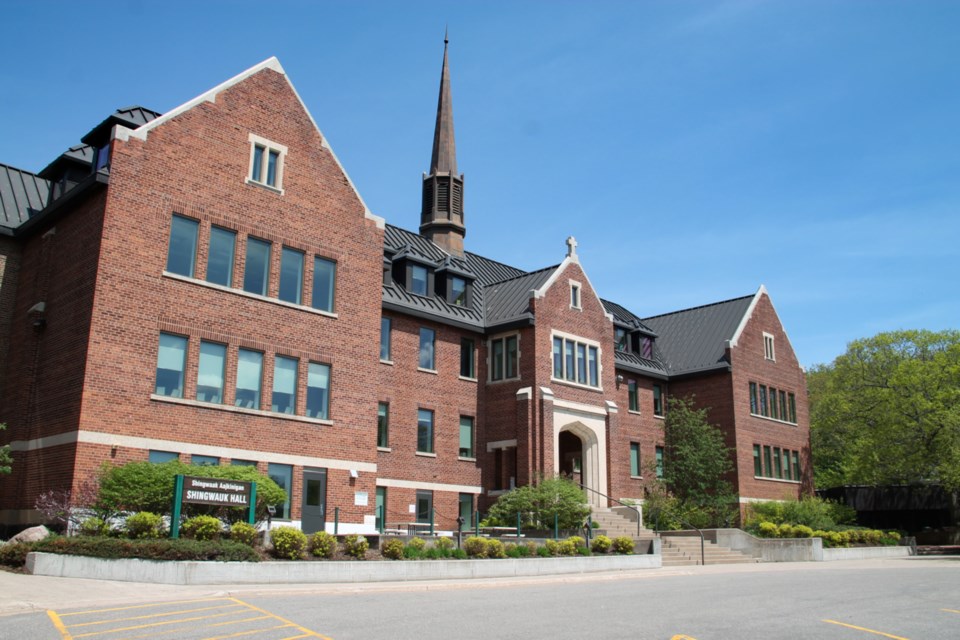With Sudbury’s Laurentian University having filed for creditor protection Feb. 1 due to what the school calls "unprecedented financial challenges" and, earlier this week, having announced it will cut 69 programs at both the undergraduate and master's levels, alarmists might think ‘is the Sault’s Algoma University next?’
The answer to that is an unequivocal ‘no,’ said Asima Vezina, Algoma University president and vice chancellor, speaking to SooToday Wednesday.
“I understand, from the media, questions that are out there around the university system – ‘how are universities doing, is this the start of something bigger?’ – and I want to reassure our community that while Laurentian’s context is very complex and very multifaceted, it is not the context of the university system in Ontario and it’s certainly not Algoma’s context.”
“Algoma is in a very good fiscal situation today, for a lot of reasons. We’ve been really working hard on some very specific strategic goals and priorities. We’ve been focused on enrollment growth to 3,000 (full time students) and we are meeting our targets. We are focusing right now on continuing to build healthy financial reserves, ensuring that we have good financial policies in place that will guard the institution against any poor decision making or planning in the future. I think Algoma is doing all the right things,” Vezina said.
“I’m very confident. There is no reason for anyone to be concerned about Algoma University moving forward.”
Vezina praised Algoma’s “very strong board” of governors for “doing all the right things” and keeping an eye on Algoma’s fiscal health.
Vezina said much of that health can be attributed to the school’s approach to diversifying its enrollment markets, both domestic and international, by focusing on high growth programs over the last three years, such as Information and Communication Technology (ICT), looking at new programming, focusing on its special mission (serving the needs of northern Ontario and Indigenous communities across the country) and by becoming a teaching oriented university.
“I believe our graduation to employment rate is actually 100 per cent (for Algoma ICT grads).”
Vezina said the university has also beefed up its highly relevant business and environmental studies programs.
Algoma is intending to improve existing, in-demand programming while also planning to offer “three or four” Masters programs in the future (focusing on the sciences, computer science and business), Vezina said.
“The other big area we’re focusing on right now is mental health and addictions and we’ve got a lot of programming being developed at the university.”
The school is working on creating a much needed Northern Ontario Institute for the Prevention and Treatment of Mental Illness and Addictions, working with numerous partners such as Sault Area Hospital (SAH) and its Indigenous partners at Shingwauk Kinoomaage Gamig (SKG).
Microcredentials, designed to give students a quicker way to upscale and reskill themselves, is another avenue Algoma is keen on, Vezina said.
All that planning for improving existing programming and adding new relevant programming as time goes by at Algoma contrasts with several programs, cancelled at Laurentian, which have been described as having low enrollment.
Student frustration at Laurentian is mounting.
110 of its faculty members will be cut.
The university is down to 107 undergraduate programs and 33 graduate programs.
Organizations such as the Ontario Confederation of University Faculty Associations (OCUFA) and the Laurentian University Faculty Association (LUFA), as well as the NDP, are calling for the resignation of Laurentian leaders and Minister of Colleges and Universities Ross Romano over Laurentian’s filing for bankruptcy (a first for Ontario).
Still, Vezina emphasized Algoma does not see Laurentian’s trouble as Algoma’s opportunity, a chance to take away its students and offer programming that was cut at Laurentian.
“I think it’s really too early to tell, the list of course and program cancellations came out on Monday...if students and faculty who have been displaced are in need of programming that we offer, of course we’re here to do that but really that is not (what Algoma is looking at)...I think our focus needs to be on supporting Laurentian right now (in a moral support sense).”
“My heart goes out to all affected by what’s happening at Laurentian right now,” Vezina said.
“Certainly this has been very difficult on the Algoma University community, watching what’s happening at Laurentian. They’re really concerned about the people and what they’re going through,” Vezina said, pointing to the long, official affiliation the former Algoma University College (AUC) had with Laurentian before Algoma officially became an independent university in 2008.
“We’re just very, very concerned...we just want them to know we're thinking about them right now.”
“It (Laurentian) is a gem of the north and we really need to support them as they’re working through this very challenging situation,” Vezina said.
“We need our four universities in northern Ontario (Algoma, Laurentian, Nipissing and Lakehead)...their success is our success, and our success is their success.”
